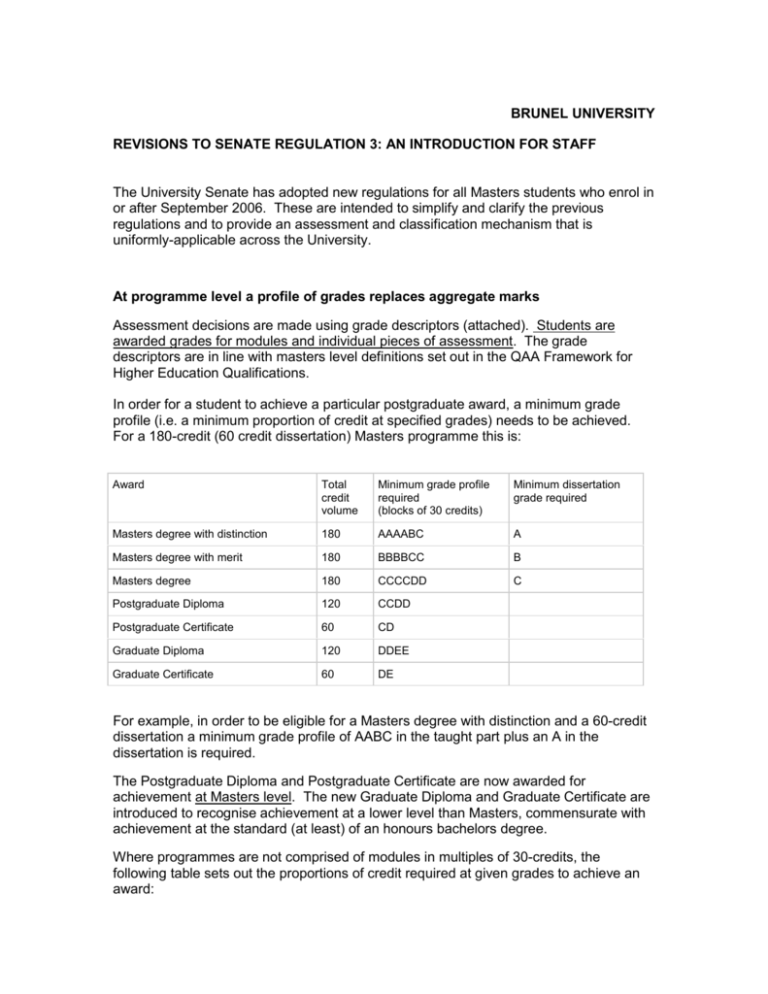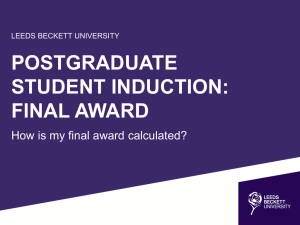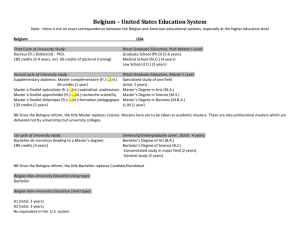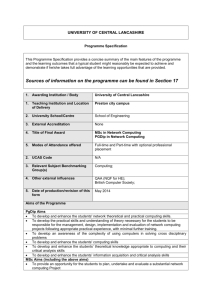Brunel University Masters Regulations: Grade Profiles & Awards
advertisement

BRUNEL UNIVERSITY REVISIONS TO SENATE REGULATION 3: AN INTRODUCTION FOR STAFF The University Senate has adopted new regulations for all Masters students who enrol in or after September 2006. These are intended to simplify and clarify the previous regulations and to provide an assessment and classification mechanism that is uniformly-applicable across the University. At programme level a profile of grades replaces aggregate marks Assessment decisions are made using grade descriptors (attached). Students are awarded grades for modules and individual pieces of assessment. The grade descriptors are in line with masters level definitions set out in the QAA Framework for Higher Education Qualifications. In order for a student to achieve a particular postgraduate award, a minimum grade profile (i.e. a minimum proportion of credit at specified grades) needs to be achieved. For a 180-credit (60 credit dissertation) Masters programme this is: Award Total credit volume Minimum grade profile required (blocks of 30 credits) Minimum dissertation grade required Masters degree with distinction 180 AAAABC A Masters degree with merit 180 BBBBCC B Masters degree 180 CCCCDD C Postgraduate Diploma 120 CCDD Postgraduate Certificate 60 CD Graduate Diploma 120 DDEE Graduate Certificate 60 DE For example, in order to be eligible for a Masters degree with distinction and a 60-credit dissertation a minimum grade profile of AABC in the taught part plus an A in the dissertation is required. The Postgraduate Diploma and Postgraduate Certificate are now awarded for achievement at Masters level. The new Graduate Diploma and Graduate Certificate are introduced to recognise achievement at a lower level than Masters, commensurate with achievement at the standard (at least) of an honours bachelors degree. Where programmes are not comprised of modules in multiples of 30-credits, the following table sets out the proportions of credit required at given grades to achieve an award: Award (total credits required) Minimum dissertation grade required Maximum taught module creditvolume permitted at given grades A B+C C D E F Graduate Certificate (60 credits Any Any Any Any 30 0 Graduate Diploma (120 credits) Any Any Any Any 60 0 Postgraduate Certificate (60 credits) Any Any Any 30 0 0 Postgraduate Diploma (120 credits) Any Any Any 60 0 0 Masters degree (180 credits) Any Any Any 60 0 0 Any Any 60 0 0 0 Any 60 30 0 0 0 Masters degree with merit (180 credits) Masters degree with distinction (180 credits) Minimum of grade C Minimum of grade B Minimum of grade A At module level, the overall grade is determined by the grades awarded for each element of assessment At the module level, if a module has more than 1 element of assessment the overall grade for the module is determined by calculating a particular weighted combination of the individual assessment grades. E.g., if you had two pieces of coursework, the first of which was weighted 60% and the second weighted 40% of the module, and you received B in the first and A in the second, the overall module grade would be B. If any individual element of assessment in a module receives grade F then the module is always failed (but reassessment may be possible). SITS will calculate the grade automatically for from the results entered. An Excel spreadsheet is available for download from the University intranet site to determine the module grade for any set of elements and weightings. Re-assessment A student who fails to achieve the taught part grade profile required for the award of a Master’s degree (normally CCDD) may, as of right, retrieve up to a maximum of 40 credits of assessment and may, at the discretion of the Board of Examiners, be permitted to retrieve a further 20 credits of assessment. A student who fails the dissertation may be permitted to revise and resubmit the dissertation on one occasion only. The principle of condonation is not recognised under the new SR3 – the minimum grade profile for an award is an absolute requirement. Variations to the regulations Certain taught postgraduate programmes may have additional or slightly different assessment frameworks, for instance a specified grade may be required in a certain module in order to meet accreditation body requirements. All variations of this kind must be approved individually by Learning and Teaching Committee. Continuing students Students who commenced studies before September 2006 will continue to study under old Senate Regulations 3, unless individually approved by Learning and Teaching Committee. A note on the difference between old and new SR3 It can be tempting for staff and students to try to compare decisions and results under old and new SR3, perhaps to try to determine which is the ‘easier’, and which ‘harder’. Because the new SR3 incorporates a new way of recognising achievement at all levels (element, module, award and classification) a simple comparison is neither possible nor appropriate. It should also be noted that grades will now be assigned to elements of assessment with reference to the new grade descriptors, rather than a percentage mark achieved, with the result that the ‘new‘ grades in many subject areas will not be strictly comparable with the grading scheme set out in old Senate Regulation 3.17. References Registry guidance for students on new SR3: http://intranet.brunel.ac.uk/registry/QS/postgraduate_assessment_framework.shtml New Regulations: http://www.brunel.ac.uk/about/administration/rules/senateregs Before the start of the academic year please contact Candy Stevens (candy.stevens@brunel.ac.uk) in the Registry for a copy of the full Regulations. Who to contact for further information Susan Lapworth, Head of Registry Derek Milligan, Director of Postgraduate Courses Nick Holland, Assistant Registrar (Quality and Standards) Generic Master's-Level Grade Descriptors Masters with Distinction/A Clearly demonstrates a sophisticated, critical and thorough understanding of the topic. Provides evidence of originality of thought and clearly demonstrates the ability to develop a highly systematic and logical or insightful argument. Demonstrates excellence in the appropriate use of the relevant literature, theory, methodologies, practices, tools, etc., to analyse and synthesise at an advanced level. Shows exceptional clarity, focus and cogency in communication. Masters with Merit/B Clearly demonstrates a well-developed, critical and comprehensive understanding of the topic. Clearly demonstrates the ability to develop a systematic and logical or insightful argument. Demonstrates a high degree of competence in the appropriate use of the relevant literature, theory, methodologies, practices, tools, etc., to analyse and synthesise at an advanced level. Shows a high level of clarity, focus and cogency in communication. Masters Pass/C Demonstrates a critical and substantial understanding of the topic. Demonstrates the ability to develop a systematic and logical or insightful argument. Demonstrates a significant degree of competence in the appropriate use of the relevant literature, theory, methodologies, practices, tools, etc., to analyse and synthesise at an advanced level. Provides evidence of clarity, focus and cogency in communication. Graduate Level Pass/D Provides evidence of some critical understanding of the topic. Demonstrates some ability to develop a structured argument. Demonstrates a degree of competence in the appropriate use of the relevant literature, theory, methodologies, practices, tools, etc., to analyse and synthesise, but not at Masters level. Provides evidence of effective communication. Narrow Fail/E Work that does not demonstrate achievement of some learning outcomes defined for a Graduate Level Pass, but which provides strong evidence that Grade D is within the reach of the student.








